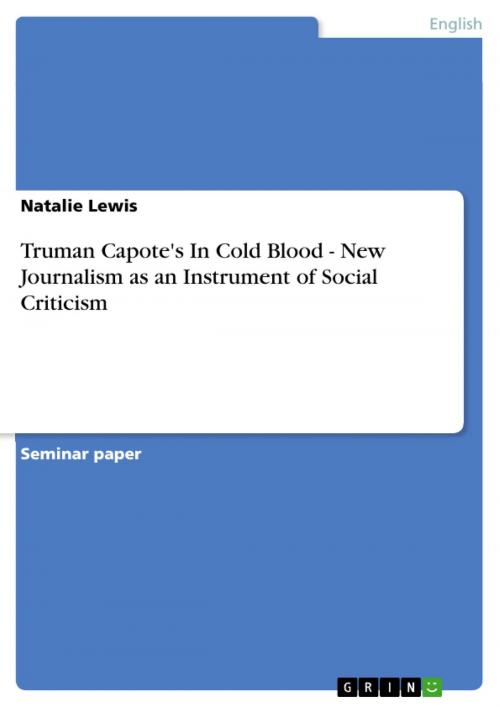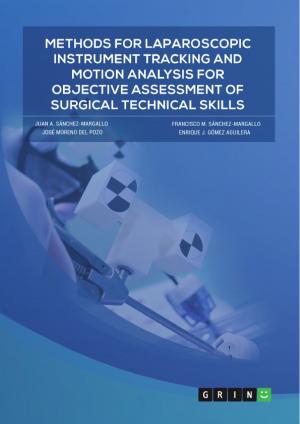Truman Capote's In Cold Blood - New Journalism as an Instrument of Social Criticism
New Journalism as an Instrument of Social Criticism
Nonfiction, Entertainment, Drama, Anthologies| Author: | Natalie Lewis | ISBN: | 9783638507547 |
| Publisher: | GRIN Publishing | Publication: | June 2, 2006 |
| Imprint: | GRIN Publishing | Language: | English |
| Author: | Natalie Lewis |
| ISBN: | 9783638507547 |
| Publisher: | GRIN Publishing |
| Publication: | June 2, 2006 |
| Imprint: | GRIN Publishing |
| Language: | English |
Seminar paper from the year 2004 in the subject American Studies - Culture and Applied Geography, grade: 1,7, Free University of Berlin (JFK), course: American Culture of the Sixties, 17 entries in the bibliography, language: English, abstract: In 1965, one of America's most controversial authors, Truman Capote, published his non-fiction novelIn Cold Blood,an account of the 1959 murder of four members of a Kansas farming family. The work does not only give a broad panoramatic description of the world of the victims and their killers but also captures the image of a society standing on the verge of unknown challenges and threats. The American post-war decade was marked by a stable economy, widespread prosperity, social mobility and conformity. As President Eisenhower pursued the Cold War abroad, American society was concerned with security at home. The young generation of the 1950s conformed to traditional family values; marriage and birth rates reached a record high. Many citizens could now afford to obtain the American dream: a house in the suburbs, at least one car and a television set. The ideal middle class family, as it was epitomized in the media, consisted of a providing father, a cheerful homemaker and mother, and disciplined children. In the 1960s, a climate of rebellion, confrontation and upheaval altered the consensus which had dominated the nation throughout the Eisenhower era. The country suddenly found itself in an ongoing crisis. Social reform movements challenged established traditions and moral values. American culture was profoundly transformed as the 1960s created a more open society in which social structures were questioned, trust in the government dispelled, free expression expanded and counter-cultural life styles emerged. In his novelIn Cold Blood,Capote questioned the essence of American society, its judicial system and the way in which crime and criminals are dealt with. He effectively used the non-fiction novel as an instrument of implicit social criticism. By applying literary techniques to non-fictional material, the author looked beyond the surface of given facts and turned the Clutter case into an allegory of American social life.In Cold Bloodexposed the fragility of American family values and revealed the ambiguity of the American way of life by contrasting middle class affluence with an economic underworld of deprived Americans.
Seminar paper from the year 2004 in the subject American Studies - Culture and Applied Geography, grade: 1,7, Free University of Berlin (JFK), course: American Culture of the Sixties, 17 entries in the bibliography, language: English, abstract: In 1965, one of America's most controversial authors, Truman Capote, published his non-fiction novelIn Cold Blood,an account of the 1959 murder of four members of a Kansas farming family. The work does not only give a broad panoramatic description of the world of the victims and their killers but also captures the image of a society standing on the verge of unknown challenges and threats. The American post-war decade was marked by a stable economy, widespread prosperity, social mobility and conformity. As President Eisenhower pursued the Cold War abroad, American society was concerned with security at home. The young generation of the 1950s conformed to traditional family values; marriage and birth rates reached a record high. Many citizens could now afford to obtain the American dream: a house in the suburbs, at least one car and a television set. The ideal middle class family, as it was epitomized in the media, consisted of a providing father, a cheerful homemaker and mother, and disciplined children. In the 1960s, a climate of rebellion, confrontation and upheaval altered the consensus which had dominated the nation throughout the Eisenhower era. The country suddenly found itself in an ongoing crisis. Social reform movements challenged established traditions and moral values. American culture was profoundly transformed as the 1960s created a more open society in which social structures were questioned, trust in the government dispelled, free expression expanded and counter-cultural life styles emerged. In his novelIn Cold Blood,Capote questioned the essence of American society, its judicial system and the way in which crime and criminals are dealt with. He effectively used the non-fiction novel as an instrument of implicit social criticism. By applying literary techniques to non-fictional material, the author looked beyond the surface of given facts and turned the Clutter case into an allegory of American social life.In Cold Bloodexposed the fragility of American family values and revealed the ambiguity of the American way of life by contrasting middle class affluence with an economic underworld of deprived Americans.















